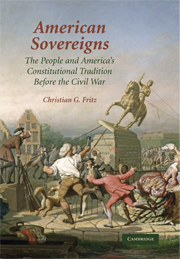PART ONE - THE PEOPLE'S SOVEREIGNTY IN THE STATES
Published online by Cambridge University Press: 31 January 2011
Summary
Independence created the need to frame new governments that reflected the legitimizing authority of the people. Steeped in English legal traditions, Americans engaged in constitution-making without completely appreciating the implications of that task. Revolutionaries agreed that the people were the new sovereigns of America who displaced the king. What that implied for traditional models of government and the relationship of the people to their new governments, however, only became clear to Americans at different times and in different ways. All of America's first written constitutions embraced the people's sovereignty and many of them expressed the inherent right of the people to scrutinize their governors and to effect constitutional change. Those constitutions reflected how deeply and widely patriots celebrated “the people” as the new sovereigns of America.
To a remarkable extent, the principles identified by America's constitution-makers resonated with Americans at the grassroots level. Far from centers of government, ideas that led to Independence and fueled the Revolution took hold among ordinary people. Reacting to local concerns while embracing the revolutionary cause, Americans made arguments drawn from the authority of the people's sovereignty, much like their state and national leaders.
The prevalence of ideas about a collective sovereign that invited challenges to the decision making of the newly created American governments inevitably triggered a reaction. Political grievances raised questions of constitutionalism when those who expressed disagreement with policies of state governments were denied the right to do so.
- Type
- Chapter
- Information
- American SovereignsThe People and America's Constitutional Tradition Before the Civil War, pp. 9 - 10Publisher: Cambridge University PressPrint publication year: 2007

